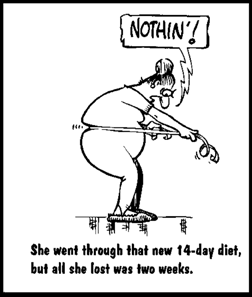You are currently browsing the category archive for the ‘Obesity’ category.
Recently, the U.S. Preventative Services Task Force recommended that doctors refer all patients with a body mass index of 30 or more to a program designed to promote weight loss. A successful program, according to the panel, combines counseling sessions with concrete weight-loss goals, nutrition advice, and education on setting limits and recognizing barriers to change. The recommendation was met with mixed reviews from doctors and politicians involved in the healthcare debate. Some cited it as a “long-overdue” prod to physicians while others acknowledged the additional responsibility it would place on doctors who are already facing time and resource constraints.
What the debate skims over, however, and what may be the most important point is not a single study demonstrates the long-term benefits of an intensive weight loss program for health. This oversight is at the crux of the war on obesity and America’s obsession with weight loss.
One of the central misconceptions fueling the task force’s recommendation is that body weight alone is indicative of health. Many studies have indicated that weight, when viewed in conjunction with other lifestyle habits like exercise, is not related to disease or early death except in the morbidly obese. Other studies point out that equal numbers of thin and fat people exhibit unhealthy eating habits and whether or not those habits become externally apparent is largely determined by genetics. To assume all fat people are unhealthy and all thin people are healthy is prejudicial and does a disservice to both groups.
Another misconception is that everyone who is fat must suffer from some form of disordered eating. In reality many people with a BMI above 30 are healthy adults who exhibit moderate eating and exercise habits. Likewise, many people at a “normal” BMI of 18.5 to 24.9 do display maladaptive eating habits. Using BMI alone as the criteria for admission into a free counseling program both sets the stage for further discrimination against fat people and excludes many “normal” weight individuals who might benefit. In short, It is a grave mistake to assume everyone at a “normal” BMI is making healthy choices and everyone above a “normal” BMI is not.
As part of the initiative, doctors are urged to refer obese individuals to programs where weight loss is the primary goal and benchmark for success. There are many problems with this. First, weight loss programs fail for about 95% of dieters and ultimately cause more health problems from the resulting weight cycles. Second, there is not sufficient evidence linking weight loss with improved health outcomes in the long run, which the task force openly admits but appears to dismiss in another classic case of succumbing to popular culture rhetoric about dieting. The task force states that in some cases, programs include exercise sessions. From an evidence-based perspective, this should be priority number one. Research has shown dramatic improvements in health from exercise alone, and obese but fit people are as healthy as fit people falling within the normal BMI criteria. A focus on weight loss over increased physical activity gives people an inaccurate tool for gauging health.
Dr. Jack Der-Sarkissian notes that more than half of all obese patients are never told they need to lose weight, and that’s just “not fair to the patient.” Hmmm…. Let’s talk about what’s really not fair. It’s not fair that doctors assume all fat people have homogenous eating habits and weight loss is the lifesaving miracle panacea. It’s not fair that doctors assume a fat person is automatically unhealthy and on the flip side, a thin person is healthy. It’s not fair that so many medical problems a fat person encounters are attributed to weight with no further investigation. It’s not fair that people at “normal” weights are rarely offered nutritional advice, diagnostic testing, or counseling because they are assumed to be healthy. It’s not fair that so many people with diagnosable eating disorders do not get the treatment they need because they don’t meet certain weight criteria, while the government wants to the foot the bill for every fat person to a enter a weight loss program.
When will health officials come to realize that both physical and mental health are independent of body size and the people who could actually benefit from counseling fall all along the weight continuum.
I hate to admit it, but I was wrong.
Back in April of 2010 I wrote a blog entitled “Life, Liberty, and the Pursuit of Fatness” discussing the fat acceptance movement. I questioned its motives, pointed the finger at what I thought were its unreasonable claims, and flat out refused to believe that being fat could be healthy. You see, like most people who have grown up in the “fat is bad” era, when I heard news reports claiming we are drowning in a nationwide obesity crisis (talk about a loaded expression), I jumped on the lifeboat.

It took a good amount of critical research, reading between the lines, and turning a deaf ear to the popular media fat-bashing machine before I would be willing accept the possibility that all my nutritional indoctrination might be wrong. But wrong I was.
A lot of current claims about the obesity crisis are based on misinformation. In 2002, Richard Carmona, the former surgeon general described obesity as “the terror within, a threat that is every bit as real to America as the weapons of mass destruction.” And how could it not be when the Center for Disease Control reported that more than 400,000 Americans die from being overweight or obese? This shocking statistic became the headline for thousands of popular media articles and pumped millions of dollars into scientific research aimed at curing obesity.
But in 2005, an updated report from the CDC acknowledged that the previous analysis suffered from computation errors and reduced the estimate fifteen-fold, taking the 400,000 deaths down to 26,000. Further separating “overweight” and “obese” individuals from “extremely obese” individuals (BMI over 35) decreases the number even more, as most deaths are clustered in the BMI over 35 category. When “overweight” individuals (BMI 25-30) are compared to “normal” weight individuals (BMI 18.5-24) an even more interesting statistic surfaces. Overweight individuals actually live longer than normal weight people.
Research from a Canadian national health survey following more than 11,000 adults looked at the relationship between BMI and longevity. Compared to people who fell into the normal-weight category:
– Those classified as underweight were 73% MORE likely to die
– Those classified as extremely obese were 36% MORE likely to die
– Those classified as obese had about the SAME risk of death
– Those classified as overweight were 17% LESS likely to die
Eric Oliver, a political scientist at the University of Chicago says the obesity epidemic is really “a relatively small group of scientists and doctors, many directly funded by the weight loss industry, (who) have created an arbitrary and unscientific definition of overweight and obesity. They have inflated claims and distorted statistics on the consequences of our growing weights, and they have largely ignored the complicated health realities associated with being fat.”
“So what?” you may be thinking. “Just because people are living longer doesn’t mean they are living healthier lives. Everyone knows fat people are unhealthy.”

While weight is a causal factor in a couple diseases, say osteoarthritis or sleep apnea, there isn’t much evidence that excess body fat itself causes disease. Instead other variables might be at play. For example, most overweight individuals report weight cycling at some point during their lives. A single weight cycle, think a failed crash diet, has been shown to damage blood vessels and increase the risk for cardiovascular disease. Rat studies indicate that obese rats that have weight cycled have very high blood pressures compared to rats that have maintained a consistent weight.
Additionally, there is a weak association among obesity and hypertension in cultures where dieting is uncommon. Could the “cure” for hypertension actually be the “cause?”
Research also finds that overweight people report feeling more stress and anxiety, both of which are a risk factor for diabetes and cardiovascular disease. In countries where there is less stigma attached to weight, overweight individuals are not prone to the same diseases associated with obesity in the United States. Additionally, when researchers looked at a group of more than 170,000 U.S. adults, they found the differences between actual weight and perceived ideal weight was a better indicator of mental and physical health than BMI. In other words, feeling fat has a stronger implication for health than being fat.
Research indicates that activity level, combined with other lifestyle choices like sleep and social habits, are more related to health than body fat percentage. For example, one study found that obese men classified as “fit” based on a treadmill test have similar death rates as lean men classified as “fit.” The obese fit men actually had death rates one-half those of the lean but unfit men.
What about type 2 diabetes? This disease, characterized by a reduced sensitivity to insulin, is much more common among obese individuals, and thus, obesity is often blamed for its emergence. But is it possible that insulin resistance causes obesity? In this classic which came first scenario, research suggests that high levels of insulin appear before weight gain in future diabetics. This finding is consistent with the “thrifty genotype” theory, which views insulin resistance as a helpful adaptation for storing more fat during times of famine. Because fat cells do not develop insulin resistance as readily as other cells, they allow glucose and nutrients to enter, promoting excess fat storage and weight gain. The added weight gain further increases insulin resistance and the cycle continues. So is weight loss the answer?
I’ll give you a second to guess what my answer is going to be (cue the Jeopardy music).
What is a resounding NO!?! A review of controlled weight loss studies for type 2 diabetes shows that initial improvements were short-lived, and study participants returned to their starting values within eighteen months, even when they maintained their weight loss. In another study, women who underwent liposuction resulting in an average loss of twenty pounds of body fat did not show improvements in insulin sensitivity. What have been shown to improve diabetes time and time again are changes in nutrition and increased activity, even without any resulting weight loss.
What’s most unfortunate about our culture’s association between body size and health is that it paves the way for fat bashing, prejudice, and discrimination. We demonize fat, and as a result, view the people carrying it around as vessels for evil. In our quest to cure obesity, we ostracize a segment of the population. We confer them with labels like lazy, sick, bad, stupid, and unhealthy. We spend so much time trying to rid the world of “fatties” that we lose sight of what is really important: health. If we could refocus our attention on finding health at any and every size, and let go of the notion that only “average” or “normal” weight people can be healthy we could start to see actual improvements in blood pressure, cholesterol, diabetes, and a slew of other conditions previously linked primarily with weight.
In the end, by focusing so much on weight, we are preventing people from finding what every weight-loss venture promises to deliver: a long, happy, and healthy life.
Note: For further reading please check out the book Health and Every Size by Linda Bacon or refer to her blog at www.healthateverysizeblog.wordpress.com. Another great resource that promotes health and every size is thefatnutritionist.com. If you would like more information on the research I am referencing please comment or send me a message.
 Please read my follow up to this post here. I’m not afraid to admit when I might be wrong.
Please read my follow up to this post here. I’m not afraid to admit when I might be wrong.
It’s time to get controversial my friends. It doesn’t take an astute observer to note that we live in country where being fat is the norm. With about 170 million overweight adults and children in the United States, the number of overweight people outnumbers those at a healthier weight (119-149 lbs for a 5’5” woman). In fact, Americans are becoming so overweight that further classification for how overweight an individual is has become necessary. In 2000 the World Health Organization published a classification system that broke obesity into three classes: I, II, and III. For example, for someone to fall into class III obesity he or she would have to weigh at least 241 lbs at 5’5”. With scary statistics galore about the health problems associated with obesity: diabetes, heart disease, and osteoarthritis just to name a few, one would think that most overweight individuals would work toward developing a healthier body, or at least know that they should be doing that. But alas, that is not the case.
In browsing the Internet lately for health and fitness related blogs, I came across a movement of sorts centered around fat-acceptance. When I hear the term fat-acceptance a very important question comes to mind: am I being asked to accept a person regardless of the fact that he or she is fat or am I being asked to accept that being fat is good and healthy? Let me give you a little history. According to a psychology class I took in college, overweight/obese people are the most discriminated against group in the US, more so than homosexuals, people of different races or religions, or the elderly. It’s harder for obese people to get jobs, get promoted, get a bank loan, and adopt a child. Obese people fare worse in court; they receive subtle discrimination from doctors, and are passed over for college scholarships and letters of recommendation from professors. When you view the fat-acceptance movement in light of the outright discrimination overweight people face, it’s easy to see where the momentum comes from. But…and this is a very big but (no pun intended), is the unequal treatment ever warranted?
Because statistics show that overweight people will have more health problems should they pay more for health insurance? Should an overweight person be denied a job because he or she might not be able to meet its physical demands? Should a larger person have to pay for two seats on the plane if one is insufficient? Where do you draw the line between discrimination and facing the consequences for poor health choices you made? Or in other words, is accommodating obesity the responsibility of the obese individual or the world in which that person lives?
While I whole-heartedly believe an overweight person should NEVER be stereotyped as lazy, stupid, irresponsible, greedy, or gluttonous, I also believe that I shouldn’t be charged with discrimination or hate mongering for saying I think it is unhealthy to be fat. I think the fat-acceptance group’s initial attempt to fight discrimination has morphed into people ardently defending their right to be fat, and anyone who suggests their obesity might be a problem is wrong. In some ways, it is denial at its finest.
For example, some people entrenched in the fat-acceptance movement purport that health is independent of body weight, and the risks associated with obesity have been exaggerated to cover for cultural prejudices against fat. Some even argue that obesity has not been found to be the cause of any health problems. Additionally, a segment of people within the movement view fat people who are trying to lose weight as deserters of the cause and thin people as the enemy. A recent blog I read condemned Jamie Oliver’s new show called Food Revolution. In it, Jamie fights for healthier, less processed foods to be served to kids in pubic schools. The author claimed that he was being a condescending ass for trying to impart his beliefs on the school system, and that he openly supporting fat hatred. What?! Since when is trying to feed kids healthier food evil? But I digress…
Think about it this way. If you were smoking and your doctor said to stop because it causes health problems would you be offended? If you were an alcoholic and your doctor told you that you needed to go to rehab and stop drinking, is he being discriminatory and hateful? I see obesity in the same light. If you are obese, there is a very good chance that you are not healthy, and when a doctor says, you need to eat less/healthier and move more he is only saying what will be best for your health in the long run. Yes, if you want to be fat you can be fat… just don’t get mad because other people think you are making an unhealthy decision.
NOTE: And these are some very important notes because of the complexity of the issue and the limited space I have to blog.
1) I know a lot of the struggles people have with obesity go way behind choosing to eat healthy or not. I am not suggesting it is that simple. Obesity has an enormous amount of contributing factors: socioeconomic status, availability of healthy foods and education on nutrition, genetics, and a hundred other environmental factors.
2) I think it is wrong on all levels to assume anything negative about a person’s character, morality, or personality because he or she is overweight.
3) I know it is possible to be unhealthy and at normal weight…hence the popular expression “skinny-fat.” And I believe all people with unhealthy diet or lifestyle habits should be held accountable, and then offered the support and information necessary to change those habits if they see fit.
4) If a person eats moderately healthy and leads a moderately active lifestyle and his or her body is still fat, then that is exactly how that person’s body should be. We are all genetically different and should accept/welcome those difference as long as they stem from a healthy lifestyle. What I fear is happening is that some fat people are using the fat-acceptance movement as validation for their unhealthy lifestyle.
Here is an example of a blog that supports fat acceptance in case you want to check it out:
And here’s a fat-acceptance attitude I can get behind:















